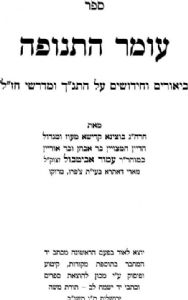A Short Tribute
Hacham Amor Abitbol, son of Shlomo, was born in 1782 in Sefrou, Morocco. In 1798 he married Donna Elbaz and the couple had ten children born to them.
Hacham Amor Abitbol dealt in commerce and would study Torah during the night. He was famous for his hospitality and his home was open to everyone. Hacham Yaakov Abuhatzeira – known as the Abir Yaakov – would be his guest whenever he came to Sefrou from Tafilalt.
Hacham Amor Abitbol corresponded with the sages of his day, including Hacham Yitzhak ben Walid, Hacham Yosef Birdugo, Hacham Amram Elbaz and others. He had many students, including Hacham Moshe Raphael Elbaz, known as the RAM"A.
Hacham Amor Abitbol died on 1 Shevat, 5614 (1854) after a prolonged illness.
Hacham Amor Abitbol wrote extensive explanations and original commentary on the Torah that were published in the following books: Minhat ‘Omer – Responsa, ‘Omer Hatnufa – Commentary on the Torah, ‘Omer Man – Sermons on the weekly Torah Readings, Et HaZmir – missives and poesies, Shirat ‘Omer – commentaries on legends of our sages, Shirat Ha’Omer – poems and liturgical songs.
A few quotes from the Rabbi on 'Tzedakah and Healing' in which he teaches that charity is a face to face encounter, as when a person kisses a friend
“Faithfulness and truth meet”. Meaning that whenever one does charity for its own sake, in true faith, then “justice and peace kiss”, meaning that the attribute of justice and the attribute of peace join face to face, just as when a person kisses a friend face to face. Abundance then fills the world, mercy flourishes, verdicts become more moderate and the world is replete. This is also indicated by the verse “Hear, O Israel, the LORD our God is One”. The people of Israel inform one another and say to each other that the attributes of the Eternal - that is, the Name of mercy and the Name of God that means judgment must be bound together and united. That is what "God is One" means – that Jews inform one another and say to each other that "we are all to be face to face and joined by the love of God, that we may love Him with all our souls and with all our might" – referring to the commandment of giving of one's wealth to charity. That is the meaning of "Love the Lord your God".
Hacham Amor Abitbol, Omer Man, p. 263, Beit Oved Institute, Jerusalem, 1989
